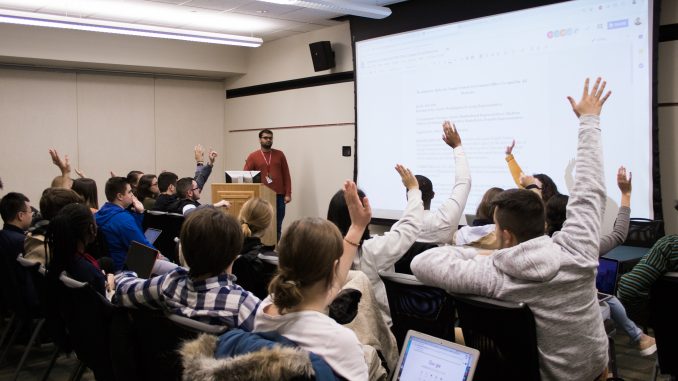
Parliament members proposed eight resolutions, some of which are meant to provide solutions to the body’s ineffectiveness, during its meeting Monday.
The resolutions count toward the 15 resolutions Temple Student Government’s Ethics Board mandated Parliament propose by the end of the semester after the body failed to introduce any during the last several months.
Three of the resolutions, proposed by the Committee on Parliament Reform to improve the effectiveness of the body, were passed.
“Never mistake moving for motion…That’s what this committee was created for, to affect change for our constituents,” said Emanuel Wilkerson, a Parliament at-large representative, during a meeting for the Committee on Parliament Reform on Nov. 15.
The resolutions created by the reform committee include creating an open records officer for the body, adding new positions that would ensure members are active and designating resolutions as “killed” if no action is taken.
Two of the reform committee’s resolutions, the Open-Government Act and TSG Watchdog Act, passed on Monday. The latter would expand Parliament’s ability to compel the Executive Branch and university organizations in requesting documents or testimony.
The Open-Government Act makes all Parliament meetings where legislation is deliberated and open to the public and press, Wilkerson said. The Executive Branch would also be required to hold regular open meetings to hear the opinions of the student body and Temple community.
“People aren’t aware of us,” said Alex Rosenberg, a reform committee member and Parliament’s junior class representative. “Hopefully, we can get that exposure on campus.”
Meetings that involve an internal review of body members would reserve the right to remain private under the proposed act, and the Executive Branch can conduct closed meetings if no specific action is being discussed, Wilkerson said.
The Executive Branch and Parliament will be required to make records available from actions or meetings deemed “public” through an appointed open records officer, who has a seven-day window to respond to request. The records will include Parliament votes, committee meeting minutes and any use of funds by the Executive Branch.
“Anything you meet on and anything that uses the resources of Temple University should be open to the public,” Wilkerson said.
Rosenberg said another goal for Parliament reform is to mandate a 32-member body before the beginning of the academic year once a new Executive Branch administration is elected. This would exclude the four representatives — two freshmen, Residence Hall Association and Greek life — that must be selected during the Fall semester.
The body had to focus on filling seats throughout the semester and still has eight vacant spots, which several members said has halted the body’s efficacy.
Carmack said he is preparing more “tangible, thoughtful resolutions that will serve the student body” by the end of the semester, and committee members agreed that the body needed to do its job of enacting students’ interests.
Both the TSG Watchdog Act and committee participation resolution would increase interactions and scheduled communication between the Executive Branch and Parliament. The Temple News reported earlier this month that some members felt the Executive Branch did not provide enough oversight of Parliament’s activities, rendering it ineffective for the majority of the semester.
The Executive Branch would have more input in Parliament’s resolutions, expressing its initiatives and action on legislation as goals for both bodies. Executive members would also have a seat on Parliament’s six main committees.
Parliament passed three additional resolutions at Monday’s meeting.
It approved the construction of a dog park to start in Spring 2019. The park will be open for both students and local residents in an effort to increase community interaction. One location suggested for the park is on Diamond Street near 15th.
The second resolution gives the student body president seven days to decide whether or not to veto any legislation brought before them. The act hopes to further establish checks and balances between Parliament and the Executive Branch.
The third resolution divides ownership of the three TSG private office spaces in the Student Center to the three branches. Currently, all three offices are controlled by the Executive Branch.
Xavier Washington, an at-large representative, said the resolution will help define the branches as equal entities.
“Even though we have access, with the Executive Branch having control of all three offices, it undermines TSG,” he said. “We need to help build the legitimacy of the co-equal branches as stated in the constitution.”



Be the first to comment